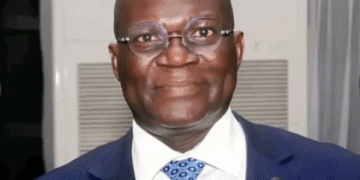Nigeria’s roads tell a silent story, not of hands raised in greeting, but of palms outstretched in coercion. At police checkpoints, the currency is fear, and the price of passage is paid in shame. What was meant to protect has become a toll on dignity. Solomon Ewela reports on this betrayal.
Across Nigeria, police checkpoints have earned a grim reputation as toll gates where officers routinely extort money from motorists. From the bustling streets of Lagos to the highways of the South-East, the story remains the same: uniformed men turning their duty posts into extortion rackets.
The situation has become so brazen that even Abuja, the nation’s capital, where proper policing should set the standard, features prominently in these damning reports. At Kubwa’s Chikakore Junction and the University of Abuja’s main gate, officers allegedly operate with impunity, fleecing commuters in broad daylight.
By nightfall, the extortion simply shifts location. Near Government Secondary School in Karu, police reportedly set up an illegal checkpoint where commercial bike riders must pay to pass. It has become a daily toll that road users cannot avoid.
A Crisis of Public Trust
The situation has deepened public mistrust in law enforcement to alarming levels. Despite official bans on illegal checkpoints, authorities have done little to curb the epidemic of police extortion on Nigeria’s roads. With brazen roadblocks operating in plain sight, the police can no longer credibly deny their existence. Credible reports suggest these illegal stops function as collection points in an elaborate graft system, with funds allegedly flowing upwards through the ranks.
Under Section 29 of the Nigeria Police Act (2020), officers may stop and search motorists if they have reasonable suspicion of criminal activity. While they can inspect vehicle documents, they cannot arrest or detain individuals for expired papers unless a crime is suspected. The Federal Road Safety Corps (FRSC) is the primary agency responsible for road safety enforcement, including document checks, meaning police should refer drivers to licensing offices for expired paperwork.
Yet the reality is starkly different. Police now routinely arrest, extort, and even detain motorists who fail to comply with their demands.
A Nationwide Outcry
The frustration reached a tipping point when lawyer and social media influencer Deji Adeyanju crowdsourced locations of extortionate checkpoints online. His post, “If you know any police roadblock in Nigeria where they extort Nigerians, please post the location below”, triggered an avalanche of responses, exposing the alarming scale of the problem.
Among the testimonies was that of a journalist, Emameh Gabriel, who described his ordeal along the Okene-Okpella corridor, as akin to “highway robbery.” Others identified recurring hotspots where officers fleece commuters under various pretexts.
The Okpella-Okene-Auchi highway has gained infamy as a hotspot for police extortion, with motorists reporting relentless harassment from officers who operate with blatant impunity along this route – turning what should be a vital transport link into a dreaded gauntlet of illegal tolls and intimidation.
Another journalist, Omeiza Ajayi, identified Kubwa, near Chikakore Junction, and the University of Abuja Permanent Site Gate as notorious spots where police officers routinely demand bribes from motorists and pedestrians.
In Jikwoyi-Karu, opposite Government Secondary School, police have institutionalized a 9pm checkpoint specifically targeting commercial motorcycle and tricycle operators for nightly extortion, according to frustrated residents.
The extortion network extends to Life Camp near the Police Education Directorate, where officers allegedly demand a N500 toll from every tricycle and vehicle passing their checkpoint. “It’s become an official illegal tax,” lamented SoundHitTV, a local observer.
The problem is not confined to Abuja. As James Patience noted bitterly: “The entire Loko-Oweto road from Nasarawa to Benue has become an extortion highway.” His pidgin expression – “na extorters full there oo” – captures the pervasive nature of this police misconduct.
In another disturbing testimony, a businessman, Efena Tosin, recounted his ordeal at the hands of officers from the Edo State Police Command. “In 2021, I was robbed of N28,000 by policemen on the Ore-Benin Expressway,” he disclosed. “They operated in a black saloon car marked ‘004.’ I reported the incident to the Department of State Services (DSS) in Osun State, but nothing came of it. One can only hope for a reformed police force in the future.”
The pattern of extortion appears most widespread in southern Nigeria, with Edo, Delta, Rivers, Lagos, and several South-East states frequently cited in complaints. Despite repeated public outcries, the menace persists, raising concerns about accountability within law enforcement.
The issue gained renewed urgency when a viral video captured an officer attached to Edo State Command illegally enforcing the suspended Electronic Central Motor Registry (ECMR) policy, a scheme the Inspector General of Police had explicitly halted in 2024 following public outcry. In the footage, the officer was seen extorting cash from a driver unable to present the discontinued documentation.
Police had so far in a statement identified the officer in question and his colleagues, including their supervising Chief Superintendent, to Force Headquarters for disciplinary proceedings. Force PRO Olumuyiwa Adejobi reiterated the service’s zero tolerance stance toward misconduct.
Yet for many Nigerians, such reactive measures offer little comfort. With checkpoints still operating as de facto toll gates.
Reports indicate that checkpoints, originally established for security purposes, are now often used as avenues for bribery. In the South-East, for instance, passengers have reported being forced to pay bribes ranging from N2,000 to N5,000 to pass through checkpoints. Those who refuse face threats of detention or physical harm, a motorists base in Edo State recounted his experience while traveling on that road.
Similarly, in the South-South region, a road trip from Benin to Okene revealed over 70 checkpoints manned by police, army, and other security personnel, many of whom openly demanded money from travelers.
The extortion is not limited to isolated incidents but appears to be a systemic issue. In some cases, officers have been observed negotiating bribe amounts and even providing change to motorists. There are also reports of officers lobbying for postings to areas with higher opportunities for extortion.
Inside Benin metropolis, police usually collect amount ranging from 100 to 200 naira depending on the vehicle, mostly from commercial taxi drivers which the police officers have made compulsory for all drivers to pay without negotiation, failure to so do will land such driver in police detention, sometimes, your vehicle would be impounded or move to their station for seizure.
Investigation reveled that some police officers even go as far as specifying amount to be paid by motorists before they are allowed passage in the road blocks which motorists, especially commercial drivers said has caused untold hardship on them and also affected their business, particularly those who are on hire purchase.
According to a commercial bus driver, Idemudia Osamwonyi “they will stop us, ask us to bring our paper and driver’s license but even if you give them, they will still ask you to pay money before they will allow us pass. If you no give the police money, they will cease your motor and carry am go their office and when the motor reach their office, we go pay 10,000 to 15, 000 naira before they will release the vehicle for you”.
While police leadership has made visible efforts to combat corruption within the ranks, stubborn cases of misconduct persist – particularly among junior officers – exposing gaps in oversight mechanisms. Despite high-profile dismissals meant to serve as deterrents, some officers continue to flout regulations with apparent impunity.
The force’s disciplinary record shows flashes of decisive action. In 2022, PC Liyomo Okoi was dismissed after a viral video showed him brutally flogging a man with a machete. That same year, the Inspector-General mandated sweeping reforms for special units and warned commanders to enforce stricter supervision or face consequences.
Yet the problem endures. In 2023 Sergeant Ekpo Shimuyere was dismissed after extorting N98,000 from Lagos residents – another case proving that punitive measures alone cannot root out systemic corruption. Sources suggest the recurring issues stem from inadequate monitoring systems and the difficulty of policing officers who operate in remote locations with minimal supervision
The Lagos Police Spokesperson, SP Benjamin Hundeyin said, Shimuyere, it was reported, collected the young man’s phone and used a POS operator to transfer N98,000 out of the N100,000 in the young man’s bank account. Hundeyin stated that the policeman’s actions were against the ethics of the profession.
The Edo State Public Relations Officer, CSP Moses Yamu has said the state command has zero tolerance for extortion by any police officer as it is against police ethics and professional conduct.
CSP Yamu said: “we want to bring to the general public that due to the report we have been receiving concerning extortion by police here in Edo State, the commissioner of police, CP Monday Agbonika has taken certain measures to help checkmate the activities of these bad eggs”.
“Part of the measures, is the immediate reform of the anti money laundry unit and the CP further directed that all tactical teams, divisions must ensure that their tags are fixed permanently on their uniforms and on no account should any team, division or area command operate with unmarked vehicle. Any vehicle that should be used for operation, must be marked with a sticker and phone numbers of the unit or command”.
CSP Yamu further explained that the Edo Commissioner of police has also directed all divisions to inscribe their phone numbers at the entrance of their office and implored POS operators to be cautious of transacting business with suspicious police officers who come in the guise of doing police jobs.
He stated that no police officer is authorized to carry out a random search of phones of individuals or persons on the road except during investigation and to achieve this, he said the commissioner of police has directed ex-squard as well as the provost unit of the Nigeria Police, Edo State command to ensure the full enforcement of these measures to protect Nigerian citizens from further extortion.
Kwara State University researchers have unveiled a damning assessment of Nigeria’s policing crisis, proposing radical reforms to combat systemic corruption and brutality. The report, obtained exclusively by Spear News, outlines three critical interventions to salvage the embattled force
The study conducted by Lambe Emmanuel Oyewole of the Department of Politics and Governance in 2024, exposes how ethical collapse at every level – from recruitment to daily operations – has created a culture of impunity.
He recommended a complete revision of the Code of Conduct alongside intensive value reorientation programme to instill professionalism. Perhaps most damning is the call to dismantle the ineffective Police Service Commission and replace it with a new Provost Office modeled after America’s Internal Affairs system, designed to operate at grassroots level where misconduct often goes unchecked.
The report advocates adopting Jeremy Bentham’s principles of transparency to prevent the chronic suppression of cases and financial abuses that have eroded public trust. With startling revelations that 83% of misconduct cases face no consequences and projections that proper oversight could reduce corruption by 60%. The blueprint presents perhaps the most comprehensive roadmap for reform since the EndSARS protests, leaving the ball squarely in the government’s court to implement meaningful change or risk further deterioration of law enforcement integrity.













































Discussion about this post